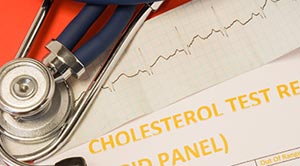 What is Cholesterol Management
What is Cholesterol Management
High cholesterol or hyperlipidemia is an underdiagnosed condition with few symptoms. It is important to have your cholesterol levels checked at regular visits with your primary care physician. Using preventive measures and treatments for patients with high cholesterol can help reduce the risk of stroke, heart disease, and other life-threatening conditions.
Your body has two types of cholesterol – LDL and HDL. High levels of LDL, or bad cholesterol can cause hardening and blocking of your arteries. Good cholesterol or HDL, can remove dangerous plaque from your arteries. Hyperlipidemia refers to excessive amounts of LDL or bad cholesterol in your body.
Risk Factors
While high cholesterol can run in families, the majority of risk factors for high cholesterol are within your control. These risk factors include:
- Diabetes
- Lack of exercise – regular exercise raises HDL cholesterol and reduces LDL cholesterol
- Large waist circumference – a waist circumference of 40 inches or more for men or 35 inches or more for women
- Obesity: A body mass index or BMI of 30 or greater
- Poor diet: A diet full of saturated fat, trans-fat and packaged foods
- Smoking
Treatment
Cardiologists can treat high cholesterol through lifestyle modifications, medications, or a combination of both.
Lifestyle modifications include:
- Consuming a low-sodium diet of fruits, vegetables and whole grains
- Drinking alcohol in moderation
- Increasing physical activity
- Limiting saturated and trans-fats
- Managing weight
- Replacing fatty meats with cold-water fish such as salmon, mackerel and sardines
- Quitting smoking
If a healthy lifestyle is not enough, or if you have a family history of high cholesterol, your doctor may prescribe medication to manage your high cholesterol. Cholesterol management medications can decrease LDL cholesterol, increase HDL cholesterol, and prevent serious or life-threatening heart conditions.